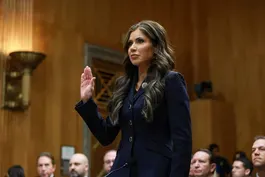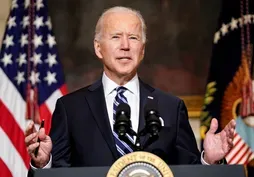
Brooks and Capehart on Biden's legacy, Trump's expectations
Clip: 1/17/2025 | 10m 3sVideo has Closed Captions
Brooks and Capehart on Biden's legacy and what to expect from Trump's 2nd term
New York Times columnist David Brooks and Washington Post associate editor Jonathan Capehart join Amna Nawaz to discuss the week in politics, including how the ceasefire agreement affects President Biden's legacy, his warning about an oligarchy in America, the confirmation hearings for President-elect Trump's Cabinet and what to expect in his second term.
Major corporate funding for the PBS News Hour is provided by BDO, BNSF, Consumer Cellular, American Cruise Lines, and Raymond James. Funding for the PBS NewsHour Weekend is provided by...

Brooks and Capehart on Biden's legacy, Trump's expectations
Clip: 1/17/2025 | 10m 3sVideo has Closed Captions
New York Times columnist David Brooks and Washington Post associate editor Jonathan Capehart join Amna Nawaz to discuss the week in politics, including how the ceasefire agreement affects President Biden's legacy, his warning about an oligarchy in America, the confirmation hearings for President-elect Trump's Cabinet and what to expect in his second term.
How to Watch PBS News Hour
PBS News Hour is available to stream on pbs.org and the free PBS App, available on iPhone, Apple TV, Android TV, Android smartphones, Amazon Fire TV, Amazon Fire Tablet, Roku, Samsung Smart TV, and Vizio.
Providing Support for PBS.org
Learn Moreabout PBS online sponsorshipAMNA NAWAZ: With one administration leaving office, and another coming in, we turn to the analysis of Brooks and Capehart.
That is New York Times columnist David Brooks, and Jonathan Capehart, associate editor for The Washington Post.
Great to see you both.
JONATHAN CAPEHART: Hey, Amna.
DAVID BROOKS: Good to see you.
AMNA NAWAZ: So, in Mr. Biden's final week in office, a lot to talk about.
He's managed to push across the finish line a cease-fire deal in the Middle East, started to cement his legacy with a prime-time Oval Office farewell address.
Jonathan, let's start in the Middle East and the cease-fire deal.
This is a war that began on his watch.
We know the U.S. has been relentlessly focused on pushing through some kind of deal.
How critical was it for Mr. Biden to get this deal before he leaves office?
JONATHAN CAPEHART: I think it was very critical.
I know some people look at this through the lens of, well, he's trying to get this done for his legacy.
And if you have been watching the president, excuse me, since October 7, he has been working.
The secretary of state had been working overtime trying to get a deal done, get a cease-fire done, get a deal that would have to get the hostages released.
And I think it was very critical for him with Trump's inauguration coming.
Let's get this done.
Let's get these people home.
Excuse me.
Go ahead.
AMNA NAWAZ: David, the idea, we have also been reporting on this, that this was as a result of coordination, right, between Biden's team on their way out and Trump's team before they have even come in, what does that say to you?
DAVID BROOKS: Yes, it was unusual and refreshing.
Brett McGurk, who was on the show earlier, he was there.
And then elsewhere in the Middle East was the Trump people.
And they were both working together.
And the Trump people very graciously said, it's the Biden administration.
They're the senior partner.
We're the junior partner here.
But I do think it was Donald Trump's pressure that really sealed the deal, because Israel had to swallow a lot for this deal.
They're trading away a few hostages, some of them dead, in exchange for terrorists, a lot of them.
And so that -- Israel didn't want to do that.
The thing that worries me is the corridor that separates Gaza from Egypt, through which supplies -- military supplies can go into Gaza.
That may go into Hamas or Gaza hands.
So it's a high price.
But I think - - and so there's no celebration in Israel.
But on the other hand, the war's over.
And some of the suffering will go back and the Gazans could go back and begin to rebuild their homes.
So it's a major accomplishment on a bipartisan basis.
(CROSSTALK) AMNA NAWAZ: Yes.
JONATHAN CAPEHART: But I would just say that this deal is a three-step deal.
AMNA NAWAZ: Yes.
JONATHAN CAPEHART: And this first step might be the easiest one.
So we're not out of the woods yet.
AMNA NAWAZ: That's right.
And it hasn't gone into place just yet either, we should note, so holding our breath.
Meanwhile, I know you were both watching, of course, as he spoke to the nation for the fifth and the final time from the Oval Office.
Here in part is what Mr. Biden had to say.
JOE BIDEN, President of the United States: Today, an oligarchy is taking shape in America of extreme wealth, power, and influence that literally threatens our entire democracy, our basic rights and freedoms, and a fair shot for everyone to get ahead.
AMNA NAWAZ: Jonathan, for a final address to Americans, it was less about listing accomplishments, really more of a warning for the future.
Was that what you expected from the president?
JONATHAN CAPEHART: Actually, I did.
And he did tout his accomplishments, but, as he did when he announced his candidacy for the 2020 election, he got into the race because he was concerned about the future of the country.
And I think it's a rather fitting, but also sad bookend that he's leaving office with really big concerns about the country, concerns that I think we should take to heart and keep our eyes open, because -- he's talking about a oligarchy.
We're about to see some of the world's richest people, richest men there at the inauguration for Donald Trump and what that means for Americans, for how they get their news and information, a whole host of things, which I think the president was getting at.
AMNA NAWAZ: David, what do you make of that?
DAVID BROOKS: Well, of course, it's normal for presidents on the way to have to do a big warning, so George Washington, entangling alliances, Dwight Eisenhower, the military-industrial complex.
So he did oligarchy.
I think he's right.
There is an oligarchy, but it's completely bipartisan.
Most billionaires in this country are Democrats.
You go to - - I speak at Aspen every year.
I think I know something about billionaires.
And there used to be one Republican, one Republican, this guy named Fred Malek, who unfortunately has left us.
But, like, the Hollywood, New York, San Francisco, these are Democratic places.
The Democratic Party has half the country, but about 75 percent of the GDP of this country.
So there is a Democratic oligarchy and a Republican oligarchy.
And so to say it's all because of Elon Musk, well, that's part of it, but there are a lot of billionaires on the Democratic side.
The thing about Biden is, we go around the country, we have followed him for decades now.
He's done a wonderful job over the course of his career, just a wonderful job.
And I go around the country in New York state or Ohio and there are manufacturing jobs coming back.
But as Frank Foer wrote in "The Atlantic" today, his job was to end -- to fight authoritarianism.
The whole thing was to preserve democracy.
And the election of Donald Trump suggested to some large degree he failed at that large mission.
And so, at some sense, a wonderful guy, he's been a great public service, but there's a sadness and a tragedy at the end of it.
JONATHAN CAPEHART: I don't know if it's so much that he failed, because he did try.
And lots of people criticized him for talking about it, including those of -- some of us in the media.
But I go back to a question that I asked I believe around the table when we were here for the marathon election night coverage, that I just wonder if, with these results, the American people just sort of gave up on democracy, or wanting to, hey, let's try this authoritarianism, this guy who has told us what he wants to do.
Let's give that a shot.
That's the thing that concerns me the most.
AMNA NAWAZ: Well, we did this week start to see the contours of a potential Trump administration with the confirmation hearings, these slew of them unfolding on Capitol Hill.
Take a look here at the list.
You saw among them the nominees for secretary of defense, secretary of state, attorney general, intelligence, energy, economic, national, security leaders, too many to name here alone.
David, what did you make of the way they unfolded, in particular, probably among the most contentious, for Pete Hegseth, his nominee to be secretary of defense?
DAVID BROOKS: Yes, I was more or less appalled by that hearing.
China is -- we're on the walking tour to war with China.
The secretary-general of NATO said, we have got to get in a war mind-set.
China's building landing craft to where they can invade Tehran.
They have got microwave weapons that have the force of nuclear power to wipe out our nuclear -- our military software.
People are warning that they're looking for first stage nuclear attack on us.
H.R.
McMaster said that a couple weeks ago.
And so it's the most dangerous security situation since World War II.
And so what is Pete Hegseth talking about?
Wokeness in the military.
How trivial.
And, frankly, the Democrats, what are they talking about?
Could they have said to Pete Hegseth, what are you going to do about -- how does drone warfare affect our confrontation with China?
AMNA NAWAZ: If I may, that is Mr. Trump's pick, though, to be the secretary of defense talking about wokeness, right?
DAVID BROOKS: Right, exactly, exactly.
AMNA NAWAZ: OK. DAVID BROOKS: I'm not -- this is not a pro-Trump speech I'm in the middle of.
(LAUGHTER) DAVID BROOKS: And -- but then, what do the Democrats focus on?
Women in combat.
Now, I happen to support the idea that a woman, if she qualifies, of course, she should be in combat.
Is that as important as preventing World War III?
No.
Talk about it.
Talk about the big issues of the day.
At the very end, a few Democratic senators, Tammy Duckworth among them, asked some big, serious questions.
But you would have to say, overall, the Republicans were the more intellectually serious group at that hearing.
They did ask about shipbuilding.
They did ask about drones.
They asked about the big, substantive issues.
But, mostly, we sidestepped the major crisis in front of the Defense Department.
AMNA NAWAZ: How did you look at the hearing, Jonathan?
JONATHAN CAPEHART: Look, Senator Duckworth was going to be my touchstone, because she did basically a pop quiz on Hegseth.
Can you name -- you're going to be doing negotiations.
You're going to be doing negotiations with ASEAN.
Can you name the nations of ASEAN in your response?
And he couldn't.
That's outrageous.
And the fact that he was picked to be the head of the Defense Department is part and parcel of what Trump has done with virtually all of his nominees, with the exception of maybe Rubio, Burgum and a couple of others, is just put people in places who look good, who will also do his bidding.
AMNA NAWAZ: Will he get confirmed?
JONATHAN CAPEHART: Oh, yes.
AMNA NAWAZ: David, do you agree?
DAVID BROOKS: I agree.
AMNA NAWAZ: Before we say goodbye here, we have talked a lot over the last two years about how this election would determine the course of this nation's future for the next several years.
As we transition from one government to the next, David, how are you looking at this?
DAVID BROOKS: Yes, I go with the recognition that Donald Trump is the most consequential American politician since Ronald Reagan.
We have seen a major shift, basically, the 50 years that Joe Biden was in office, liberal internationalism, a respect for institutions, at least attempts at bipartisanship.
You had a system in place from 1945 to 2016 that Trump said, we're taking it out.
And the fact that he's reelected and now about to take office and use executive orders to wipe out a lot of things, including the civil service potentially, or parts of it, that's just a gigantic pivot in American history.
JONATHAN CAPEHART: And this is why I believe that this -- what we're about to endure, I have great trepidation.
I mean, he's promised to do a lot of radical things.
And if he does even half of them, this country will be very different in four years.
AMNA NAWAZ: Jonathan Capehart, David Brooks, and you will be with us on Inauguration Day and for many, many weeks and months to follow.
We will talk about all of it.
I thank you both.
Always good to see you.
JONATHAN CAPEHART: Thanks, Amna.
AMNA NAWAZ: And, of course, David and Jonathan and many others will be back with us on Monday for live coverage of Donald Trump's second inauguration.
That's going to begin Monday at 10:30 a.m. Eastern right here on PBS and streaming on our YouTube channel.
Amanda Gorman pens tribute to crews battling LA wildfires
Video has Closed Captions
Poet Amanda Gorman pens tribute to crews battling the Los Angeles wildfires (4m 30s)
Gazans desperate for aid but hopeful worst is behind them
Video has Closed Captions
Gazans desperate for aid but hopeful ceasefire means the worst is behind them (7m 10s)
How businesses are preparing for Trump's tariffs
Video has Closed Captions
How businesses are preparing for the tariffs Trump has promised to impose (9m 22s)
McGurk breaks down complex negotiations to reach ceasefire
Video has Closed Captions
Brett McGurk breaks down complex negotiations to reach Israel-Hamas ceasefire (6m 56s)
News Wrap: Noem questioned about Trump's immigration policy
Video has Closed Captions
News Wrap: Noem faces questions about Trump's immigration policies (7m 54s)
Supreme Court clears way to ban TikTok in the U.S.
Video has Closed Captions
Biden White House says enforcement of TikTok ban will fall to Trump (5m 52s)
Providing Support for PBS.org
Learn Moreabout PBS online sponsorshipMajor corporate funding for the PBS News Hour is provided by BDO, BNSF, Consumer Cellular, American Cruise Lines, and Raymond James. Funding for the PBS NewsHour Weekend is provided by...


















